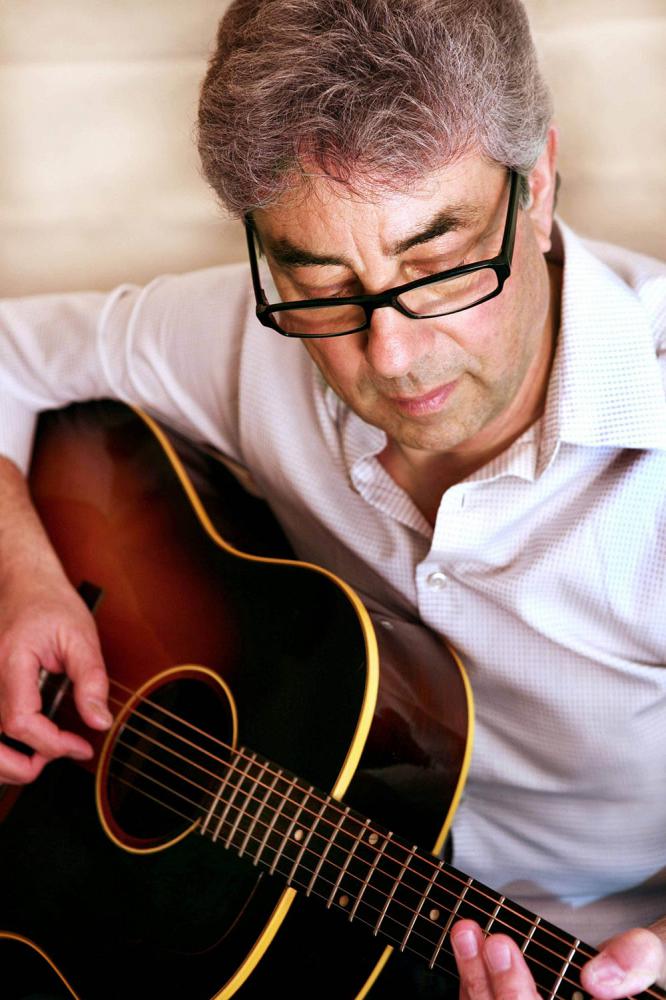Swindon Link’s Jessica Durston spoke to prolific songwriter Graham Gouldman to pick his brain about his songwriting career, ahead of his ‘Heart Full of Songs’ tour that will take place across the UK in March.
Did you know it is said that people swallow eight spiders in their lifetime?
I’m not sure if I’m convinced this is true, but I will tell you something I am sure about – most people will definitely have heard (and loved) a Graham Gouldman song in their lifetime.
The man is a musical genius, with a career spanning six decades. He is responsible for a seemingly endless list of iconic hits, including The Hollies’ ‘Bus Stop’ and ‘Look Through Any Window’, The Yardbirds’ ‘For Your Love’ and ‘Heart Full of Soul’, Herman’s Hermits’ ‘Listen People’ and ‘No Milk Today’, and many more.
And I haven’t even started on his 10cc catalogue yet! Graham was behind the band’s well-loved hits ‘Dreadlock Holiday’, ‘Rubber Bullets’, ‘Art for Art’s Sake’, ‘I’m Mandy Fly Me’, ‘Wall Street Shuffle’, and the unforgettable ‘I’m Not In Love’ – which was recently given a boost when it appeared on the Guardians of the Galaxy movie soundtrack.
He has shown his great range as a songwriter over the years, first starting out creating well-loved commercial pop records for other artists in the 1960s (as well as recording his own debut album), then creating a new incredible sound, writing biting and sometimes satirical earworms in the 1970s with Hotlegs, and then 10cc; to then focusing on writing his own solo material, painting beautiful vignettes of his own personal experiences through song (see And Another Thing from 2000).
Within this interview Graham discusses everything from his upcoming semi-acoustic tour ‘Heart Full of Songs’, to his thoughts on songwriting and ownership, to his time writing his brilliant 60s hits for other famous artists, to his advice for budding songsmiths. We covered a lot of ground within our allotted time!
The first point of call was to check in with Graham about his upcoming tour ‘Heart Full of Songs’ (HFOS). He will be joined by bandmates Iain Hornal, Keith Hayman and Dave Cobby, and the outfit – fronted by Gouldman – will take the audience on a trip down memory lane, and also on a journey through the 10cc legend’s own songbook. I was keen to find out more about what audiences could expect, and Graham was happy to divulge more details.
He said: “Heart Full of Songs is a real mixed bag setlist wise. We do some 10cc songs that I co-wrote, and a lot of songs that I wrote from the 60s for artists including The Hollies, The Yardbirds, Herman’s Hermits, and some from my time with Andrew Gold in Wax, as well as album tracks and film music.
“HFOS actually started off during a 10cc tour because we didn’t have a support act, and I felt we should. I used to go on stage before 10cc and sing a few songs. The idea really stuck with me, and I expanded my little act and it became Heart Full of Songs.”
Audience members can also expect the man himself to be introducing each of his tracks and contextualising them.
Graham added: “Yeah, that’s one of the things that makes this tour a bit different - I’m able to talk about the songs more, and about what inspired them. I find people are always really interested in that.”
Graham will be performing a number of UK shows as part of the HFOS tour that will be taking place from 9 – 23 March. The tour includes a date at the Haymarket in Basingstoke on Saturday 18 March. More information and tickets are available from https://www.thegigcartel.com/Artists-profiles/10ccs-Graham-Gouldman.htm
Moving on, I was interested to know if the songwriter had any particular favourites songs to perform, after we had both expressed our shared love for his iconic 1966 track for The Hollies ‘Bus Stop.’
After all these years performing different tracks with different musicians – were there any songs he began to tire of performing, or similarly, were there any that were so dear to him that he felt he could play them for all eternity?
“They’re all great – all the songs.” Graham gushed. “I suppose it’s different – fresh, every time we perform, because our audience is different every night. I always sort of put myself in the audience and remember it’s the first time for them. There’s not really any song or piece that I get tired of singing to be honest. I just really enjoy it.
“That enjoyment is key – and as long as everyone else is also enjoying themselves at our gigs, I’ll keep doing what I’m doing. That drives us on.”
With the tour being semi-acoustic and not the full band setup he would be used to with 10cc or Wax, our discussion turned to how he adapted his songs for this particular style of concert.
Graham explained: “We have had to adapt the songs to a certain extent with this semi-acoustic tour, and it has given us a chance to arrange the songs and showcase them in a slightly different way.
“We have worked to only adapt certain tracks that we think suit the style of the semi-acoustic band best, because some of the bigger numbers meant for full bands might not translate as well as others without certain instruments.
He added: “There are some songs I could do, but I won’t do because I don’t feel that they suit the acoustic arrangement. I’m really careful with that, because I want every track on our setlist to sound good.”
Graham will be placing himself in the spotlight for this upcoming tour and has appointed himself as the band’s frontman. As his 10cc days saw him famously sing lead on the 1978 classic hit ‘Dreadlock Holiday’ - but also share the lead vocal duties with his bandmates - I was curious to know if HFOS was going to feel more exposing. This tour, after all, will be highlighting his craft in more of a concentrated solo setting.
He was quick to agree with this notion.
“Definitely, I’m singing everything on this tour, whereas with 10cc we would have different lead vocals on different tracks. Yes, you’re absolutely right, you are more exposed in this kind of setting and you have to be a bit more on your game!” Graham said through chuckles.
“I don’t mind it though – I enjoy myself. If I stopped enjoying it, I wouldn’t do it – and I say this for two reasons. One, I don’t need to do it. And secondly, I think audiences pick up on it you know? I think they can tell when a performer isn’t happy or is just ‘going through the motions.’ They can tell, and I don’t think that would be right.”
Satisfied with this answer, I then took the opportunity to move the subject of conversation into more reflective or dare I say introspective territory. So as we’ve established, Graham is a genius – I know this is not news to most of you readers, as that is likely why you have clicked through to read this article in the first place.
The man wrote classic tracks for 60s and 70s superstars, and has worked for, or with, Kirsty MacColl, Paul Carrack, McFly, and more recently Ringo Star and Brian May. This got me thinking what must that have been like to create something incredible, and then pass it along to someone else?
What is it like to know that unless an individual bothers to check the back of the record sleeve or get on to trusty old Wikipedia, that your name and your craftsmanship, may not be the first thing immediately associated with your own song?
For the ever-humble Mr Gouldman though, this does not seem to be an issue. Everything for him, is about the music – the art form itself. He is just happy that people come to listen and enjoy themselves. He ruminated on the question and shared his perspective.
He said: “Do you know, I have had no problem with it to be honest. When I do the HFOS shows, people will come up to me afterwards and say, ‘I had no idea you wrote that’ – and I just think, well why would you know? Unless you’re a real music aficionado, then I suppose you might not necessarily know who’s written everything, all the time.
“I must admit, I am very much like that though – on the aficionado side - whenever I buy a CD or listen to a track, I always want to know who’s played what and who’s written the piece. I like looking at the credits and I want all the information. Most people know the names of most artists, but I wouldn’t say they always know who writes everything and I accept that. I don’t expect people to know it all.
This then got me thinking about the idea of control and ownership – did he ever get the feeling that he was relinquishing anything when passing his work over to another performer or band?
Apparently not at all! Graham’s outlook struck me as being so liberal and modest – I discovered he views himself as more of a servant to the music-loving masses than anything else.
He pronounced: “I never felt like I was relinquishing control to be honest. I think the job of a songwriter is to write songs for people, so we’re not really relinquishing anything.
“For me, it’s an odd way to think of it as giving something up or relinquishing control as you’re not giving anything up really. You still wrote it, and you still have your name on it.
“I don’t mind, whether I’m singing the song or someone else is singing it. First of all, just the act of creating the song in the first place, is a gift, and then if someone likes it enough to record it, then I see that as brilliant.”
Graham added cleverly: “It’s always your baby, but someone else has adopted it.”
These remarks led me on to my next question – did anyone throw his proverbial ‘baby’ out with the bathwater? Were there recordings of his songs that he didn’t like – was this a difficult thing to be faced with?
Graham was happy to enlighten me, and ever the gentleman, he said:
“There have been certain songs within my book of work that have been covered copious amounts of times but it is very rare for me to hear something I don’t like. It’s not often I listen to something of mine covered and think ‘this is a disaster.’ Generally, you have to think of it as just somebody’s interpretation of something you have written.
“Sometimes you might hear a track adapted for a completely different genre of music, and you might think – this isn’t for me, like disco for example.” He chuckles.
“The thing is, once a song is published, anybody can record it. They don’t have to get permission to do it – and I think that’s great. It’s fine by me. The more people that record songs I’ve written or co-written, the better.”
But Graham’s free approach does have its limits…
“There’s only a problem when the song is being used or re-recorded for something – say a political rally – without an artist’s permission. That is an issue and I can see why people would get upset by this. That sort of thing is really not on. But otherwise, I think it’s fair game.”
At this point, I know what you’re all thinking – but where did all this talent come from? Did Graham always know growing up that he was going to be a music star? I was thinking the same thing, and don’t worry I asked on your behalf.
He explained: “I knew from a very early age that music was going to be part of my life. I never had any problems and I feel very lucky, looking back. One of the first songs that I wrote that got recorded and placed for an artist was ‘For Your Love’ which ended up becoming a massive hit for The Yardbirds.
“I wouldn’t say I expected it to happen but I knew if I didn’t have any success as a songwriter, I’d still be involved with music because I love to play, and I love working with other musicians. I know I would still be doing that if I didn’t end up where I am today.”
I followed this statement up with a further question: “So you could say your life was already mapped out for you then? It was like fate, due to your affinity for music?”
“Yeah, kind of in a way - but I can’t do anything else so I’m lucky really! I never had any interest in doing anything else! It’s the best job in the world – if it is a proper job.” Graham responded.
“I think making people happy and helping them through the things going on in their lives is a job…” I countered.
Graham agreed: “There is that aspect to it, yeah. It’s only when you’re on the road and you see the look on people’s faces - that the song means something to them - that you realise how much joy you are actually giving to people. And it’s a lovely thing to have people sing your words back to you.”
Pressing on, the interview’s topic of conversation turned to the genesis of a song. For Graham, there is no set way that he starts writing.
He commented: “It varies for me, when I start to write a song. Sometimes it’s a song title that will come to me first, sometimes I might have the line of a lyric, sometimes I might have a bit of a melody or a chord sequence.”
This answer had me curious as to whether he felt his songwriting style or process had changed over the years, and if so to what extent it had evolved.
He mused: “I would say yes – to a certain extent. I think there are certain songs or subject matter that someone of a certain age shouldn’t write about.
“I think also what happens is – or well for me anyway – I’m writing about more personal things – real things that have happened to me or things that I have been thinking about. I think that can make your music more genuine you know? You end up actually giving a bit of yourself to an audience – and I think people like that and sense that it is genuine as well.
“Some songs are pure fantasy and some are based in fact. Sometimes I think artists can write about something that has happened to them without even thinking about it. I think a lot of songs come from your subconscious and lyrically you might come up with lines and you don’t really know what it means at first.
“I’m in the middle of recording a new album at the moment and one of the songs I was recording – I felt I didn’t know what the lyrics were about, even though I wrote them, you know? After listening to it more, I had originally thought it was about one thing, but then realised it was in fact about something else.”
When probed on whether there is a therapeutic element to the act of songwriting Graham added: “Yes, it is a kind of therapy – the act of writing a song itself. You’re expelling something from within and songwriters and any creative person is lucky to have that within them – to be able to express themselves through whatever medium they use.
“I think if you listen to a whole lot of records from one artist, you tend to find you feel you know the individual through what they are singing about. Even though they might not be in-your-face-fact kind of songs, the messages and pieces of that person can be found through metaphors and things like that.
“I think the main thing is to transmit a feeling – that feeling you had when you were writing the track. I want audience members to get what I’m feeling. I want them to sense and understand what I’m trying to do with a song.”
After hearing him share these thoughts, I felt Graham’s experience in the late 60s, crafting pop hits for others, could have put him at odds with really focusing in on personal expression and drawing the audience into his feelings at the time. Where would Graham himself as an artist end, and his intended recipient begin?
He said it was definitely a different experience back then, and would agree in terms of formatting songs for others. He could still be expressively free with the lyrics, but had to really think about, and write for, his intended performer/band when structuring the song, and the melody.
Graham cleared this up for me further: “The Hollies are a good example that I can use to explain my process at the time. I wrote ‘Look Through Any Window’ as a song beforehand, and they recorded that, but when I wrote Bus Stop, I actually had them in mind. Yet again, not necessarily regarding the subject matter, but I was very conscious of their vocals and how they were big on harmonies.
“I wanted them to have a song that would play to that. I wasn’t painstakingly looking at every note and thinking ‘they could sing this note with that note’ and so on, but I loved the Hollies anyway, and I had them in my head and penned the song from that.
“I felt I couldn’t make a template as it were, for them, but I knew I wanted to write a song that was very melodic and had lots of harmonies in it – and I was lucky I got this chance.”
While we were on the topic of ‘Bus Stop’ and his hit pop songs, I was keen to know more about Graham’s creative process and his psyche at the time – and then during the success of 10cc in the 70s. Did he feel a great pressure to churn out hit after hit? Did he find himself chart-chasing, and how did this pressure affect his writing?
He noted: “Back in the 60s/70s, there was certainly a bit more pressure because we did want hits. That was important to us, but that was the sort of business we were in then. I don’t think it matters as much anymore.
“I mean you always want a song to be a ‘hit’ as they say – though I’m not quite sure what this is today – put it this way – I don’t think I’m going to get five billion plays on Spotify, but I’m happy to still be making music. Writing, making and recording it, is enough for me these days.
“If something happens and it’s a hit, then great, but if it doesn’t, the pleasure is in the process of making the song, really. I’m not denying I would be very happy indeed if someone else, or if I recorded my song and it became a hit – that’d be brilliant but I’m not expecting it so I won’t be disappointed.”
By this point, it was time to draw this fascinating discourse to a close. However, before ending things, I wanted to trouble the good man for some advice for songwriters starting their journey in 2023 – or any individuals already on their journey, that were looking for some wisdom.
Mr Gouldman was only too happy to oblige.
He said: “That’s a good question… I’d say to any songwriter just don’t try to follow any trends. That can be disastrous. I know there are people that do it, and they are very successful – but for me, it’s not something I think works.
“Just be true to yourself and express yourself in the way that you want. You will come up with something that people will resonate with I think – even if they don’t know anything of your experience, if you write about it in a genuine way, people will feel it.”
There you young creatives have it – straight from the horse’s mouth.
Following this, Graham and I bade our goodbyes and I was left meditating upon his words and his liberal mindset, humming ‘Wall Street Shuffle’ to myself for the remainder of the afternoon.
More information about Graham Gouldman, Heart Full of Songs and 10cc's upcoming tours can be found on his website/social media at:
Website – https://grahamgouldman.info/
Facebook – https://www.facebook.com/GrahamGouldman/
Twitter – https://twitter.com/grahamgouldman
Instagram - https://www.instagram.com/grahamgouldman/
A link to Graham’s recently recorded track ‘Floating in Heaven’ with Brian May, can be found at https://www.youtube.com/watch?v=hOTFcnexJBg . (He assured me he loved working on this fantastic collaboration!)









Your Comments
Be the first to comment on this article
Login or Register to post a comment on this article